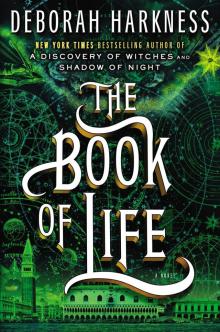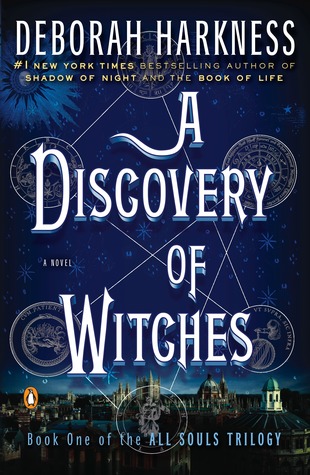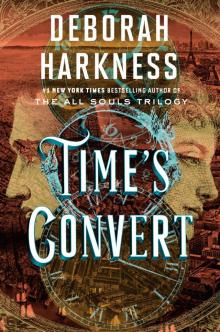- Home
- Deborah Harkness
Time's Convert Page 29
Time's Convert Read online
Page 29
After more than a month of blockade-running, stiff winds, and rough, frigid seas, the Aréthuse arrived in the French port of Bordeaux. Gallowglass had made excellent time in the crossing, thanks to a combination of utter fearlessness, an encyclopedic mastery of the currents, and the fact that the de Clermont standard frightened off every privateer and blockade-runner in the Atlantic, as he had promised it would.
As they sailed down the Gironde, Marcus eyed the French countryside with a mixture of relief and trepidation, now knowing what awaited them on terra firma.
Marcus had never strayed much beyond the Connecticut River growing up, and though the varied origins of the Philadelphia Associators had introduced him to a world beyond the colonies, he as yet had no direct experience of it. The air in France smelled different, and the sounds that came from the shore did, too. The fields were bare, except for rows of vines held up by wooden supports that would bear the fruit for the wine wearhs drank to quench their thirst when blood was not available. The brilliant leaves that had still been on the trees in Portsmouth were nowhere visible in France in late December.
Marcus had grown accustomed to seeing nothing but canvas and water, and to being in close quarters with only Gallowglass and the crew. Bordeaux was a bustling port like Philadelphia, filled with creatures of every description—including females. Once they had docked and filled out all the paperwork that was required to unload the Aréthuse’s cargo, Gallowglass led him off the ship. His cousin’s hand was firm on his elbow. Even so, the press of warm bodies, along with the bright colors and strong scents of the port, left Marcus dazed and a trifle confused.
“Steady on,” Gallowglass said in a low murmur. “Stop and take it all in. Remember what I told you. Don’t be following wherever your nose leads, like a boy trailing after every pretty girl.”
Marcus swayed on unsteady legs, feeling the ground moving beneath him and his full stomach sliding along with it. Stefan, the Aréthuse’s plump cook, had fed him that morning while they were anchored outside the harbor, waiting for the customs men to inspect their wares. Stefan not only provided sustenance to the warmbloods in the form of hardtack and grog, but fed the wearhs from his veins, too.
“À bientôt,” Stefan said cheerily as he passed, carrying the ship’s last remaining chicken down the ramp, clucking and scolding in its wicker cage.
“Until next time, Stefan.” Gallowglass handed him a fat pouch that made a satisfying clinking sound. “For your trouble.”
“Non,” Stefan demurred, though he was already weighing the coins and calculating how much he could buy with them. “I was paid before we set sail, milord.”
“Consider it a boon, then,” Gallowglass said, “for taking care of young Monsieur Marcus.”
Marcus’s mouth gaped. He had never dreamed of being worth so much money.
“Monsieur Marcus was a gentleman. It was my pleasure to serve him.” Stefan bowed low, sending the chicken hurtling forward in his cage with an angry squawk.
Marcus bowed in return. The cook’s eyes widened. Had Stefan been a chicken, he would have squawked, too. Gallowglass hauled Marcus upright and steered him away.
“Don’t be bowing to the servants, Marcus,” Gallowglass muttered. “You are a de Clermont now. Do you want the gossips noticing your strange ways?”
As a wearh who drank the blood of living creatures for sustenance, never slept, and could reduce a mizzenmast to splinters with his bare hands, Marcus felt sure that bowing to servants was the least of what warmbloods might notice.
“I suppose we can attribute your oddness to being American,” Gallowglass mused, surveying the Bordelaise on the docks. Every last one of them was festooned with ribbons of red, white, and blue. The French were more visibly patriotic than most of the citizens of Philadelphia.
“Great Jesus and his sainted mother! Who is that?” A small, dark wearh with a pronounced squint approached them through the crowd with two spirited horses in tow. Marcus could tell what he was from the way the man smelled, which was so much less gamey and ripe than a warmblood. The man was slightly bowlegged, as though he had spent too much time on horseback.
“This is Matthew’s latest project,” Gallowglass said. “Marcus, meet Davy Gams. We call him Hancock.”
“Pleased to meet you, sir.” Marcus bowed. Davy’s eyes popped.
“He’s American,” Gallowglass said apologetically.
Davy glowered at him. “You Americans have caused a great deal of trouble and cost a packet, too. You better be worth it.”
Not knowing how to respond, Marcus adopted the silent, attentive attitude that he had perfected while working for the doctors Otto.
“How old is he?” Davy demanded of Gallowglass, who was studying the faces of the people passing them.
“Bonjour!” Gallowglass called to one particularly attractive young woman wearing a red, white, and blue rosette on her bodice who was shopping among the hucksters at the wharf. He turned back to Davy. “Somewhere in his fifties, I warrant. Matthew didn’t give me exact facts and figures.”
“Damn frogs.” Davy spat on the ground. “They talk a good game, with their cockades and coffee, but you can’t trust them. Not even Matthew.”
“I’m only twenty-four, Gallowglass. I was born in 1757,” Marcus said, swallowing down the stab of desire that shot through his loins at the sight of that Bordelaise bosom, fair and freckled.
“Gallowglass means days, not years. And don’t contradict your elders,” Davy said, cuffing Marcus on the chin. Once, it would have broken his jaw; now the blow registered only as an unpleasant reverberation. “It doesn’t matter, in any case. You’re as useless as a fart in a jam jar.”
“Fuck off.” Marcus made a rude gesture, one he’d learned on the Aréthuse from Faraj, the ship’s pilot. He could now curse in Arabic as well as Dutch, French, German, and English.
“I suppose we’ll have to take him to Paris.” Davy let out an earsplitting whistle. “For that, we’ll need a carriage rather than horses. You can’t travel on horseback when you’ve got a baby with you. More needless expense.”
“I know, I know.” Gallowglass clucked with sympathy and clapped Davy on the shoulder. “I tried to put in at Saint-Malo, but the seas weren’t having it.”
“Bloody Matthew and his daft ideas.” Davy’s finger shot up in warning. “One of these days, Eric, I’m going to strangle that boy.”
“I’ll hold him down while you do it,” Marcus said, still smarting from all that he’d discovered about his new life from Gallowglass. “High-handed bastard.”
Davy and Gallowglass stared at him, astonished. Then Davy began to laugh in the gasping, unpracticed wheezes of one who hadn’t been amused in some time.
“Not yet sixty and already angry with his sire,” Davy said, wheezing and coughing some more.
“I know,” Gallowglass said fondly. “The lad has real potential.”
* * *
—
MARCUS HAD NEVER ridden in a carriage before, only a wagon. He found that he did not like it. Mostly he was able to make it outside before being sick. Hancock soon grew impatient with their frequent stops, and resorted to holding Marcus’s head out the open window so that he could continue vomiting while they traveled.
His eyes streaming from the grit from the road, Marcus clamped his teeth shut against the rising bile (his guts were empty of blood and wine by this point), and strained to overhear the conversation in the carriage, before the words were blown away by the wind.
“—Granddad will have a stroke,” Gallowglass said.
“Wasn’t Matthew strictly forbidden—” Hancock’s next words were inaudible.
“Wait until Baldwin discovers.” Gallowglass sounded both alarmed and pleased by the prospect.
“—another bloody war will break out.”
“At least Granny will—”
“—dote
on him like an old woman.”
“Watch your tongue around Marthe or she’ll—”
“—better idea to take him there if she’s in town.”
“Auntie Fanny won’t be at home. We’ll have a devil of a time—”
“—deposit him with Françoise and then have a drink.”
“It is a lot to take in—”
“—fucking boat home to his family.”
The strange names—Marthe, Fanny, Françoise—swirled through Marcus’s swimming brain, along with the realization that he had not only a grandfather but a grandmother as well. After years of being alone in the world, Marcus felt he was now part of a family. Warm feelings of obligation filled his hollow veins with gratitude. Even with his head bouncing on his neck like a pumpkin on a stalk as they careened along the Bordeaux–Paris road, Marcus was aware that he owed this third—no, fourth—chance at a new life to the chevalier de Clermont.
This new life would be his last, Marcus promised himself.
* * *
—
“REMEMBER, DON’T BOW TO ANYONE in this house. They won’t like it.” Gallowglass straightened Marcus’s limp, stained neckcloth. “I’m sure your mother was a lovely woman, but you’re in France now.”
Marcus put this bit of intelligence into a crowded compartment of his mind that he was reserving for future study.
“Soon, you will meet a woman called Françoise. She is not to be trifled with, no matter how appetizing she smells. Charles will beat you with his rolling pin if you so much as look at her,” Gallowglass continued, twitching Marcus’s coat into place. “And do not, under any circumstances, play cards with your aunt Fanny.”
An arresting combination of aromas, including pastry, lemons, and starch, filled the carriage. Three male wearhs sniffed the air like wolves tracking an alluring new animal. Marcus looked out the window, eager to see the creature attached to this irresistible scent.
“Oh la vache!” shrieked a rawboned woman of impressive height and lung capacity. “Qu’est-ce que c’est?”
“Mademoiselle Françoise. Do not be alarmed,” Hancock said, leaping out of the carriage and taking her hand. “He is nothing but a mewling infant, and poses no danger to you.”
“Infant!” Marcus exclaimed. He’d killed British soldiers, saved dozens of Americans and French patriots, assisted at several amputations, and fed off a cutthroat thief before accidentally killing him in Newburyport. He was no infant.
Marcus was, however, still a virgin. He eyed Françoise’s quivering lips with interest. They were full and moist, and promised pleasure. And the woman smelled heavenly.
Françoise’s eyes narrowed, and she pressed those lush lips together into a taut, forbidding line.
“This is Marcus. He belongs to Matthew. We thought we could leave him with Fanny.” Gallowglass climbed out of the carriage and gave the woman a dazzling smile.
It might have worked on a warmblood, but not on a wearh. Françoise crossed her arms, which made her look twice her already ample size, and snorted.
“You cannot leave him here. Madame Fanny is out,” she said.
“That does it. Take him to Philippe. Then we can make a run for it and be as far from Paris as possible when he explodes.” Davy wiped his brow with his cuff.
“Where is she?” Gallowglass sailed forth through the front doors, undeterred. Françoise bustled after him. “Denmark? Sept-Tours? Burgundy? London?”
“No, milord. Mademoiselle Fanny is at Dr. Franklin’s house. Helping him with his correspondence.” Françoise glared at Marcus, as if he were somehow to blame for her mistress’s absence.
“Correspondence, eh? Why, that old lecher.” Hancock began to gasp and wheeze again.
“We’ll just wait in the salon for her, if you don’t mind, Françoise. And perhaps Charles could fix a bit of something for young Master Marcus,” Gallowglass said cheerfully. “He’s feeling peaked from all the excitement, poor lamb.”
* * *
—
FRANÇOISE DEEMED MARCUS TOO COMMON and filthy for Fanny’s salon, and banished him instead to the kitchen.
Charles, the wearh who ruled that subterranean lair, was not female and did not smell as appetizing as Françoise did, but within thirty minutes of meeting him, Marcus felt nothing but love for the man. Charles took one look and put Marcus in a wingback chair near the fire. He then began rummaging in cellars, larders, and game pantries for something to tempt his appetite and soothe his stomach.
Marcus was sipping a heady mixture of red wine from Burgundy—he had never tasted anything like it—and blood from a Normandy wood pigeon when a tall blond wearh strode into the room. The creature was a bewildering mix of female and male, allure and aggression, sweetness and swagger. The long flaxen curls and frothy skirts indicated it was female. The crisply tailored army coat with brass buttons and braid, the triangular cocked hat embellished with a red, white, and blue rosette, the gun strapped to the hips, the culottes that peeked out from lace petticoats, and sturdy shoes suggested the opposite.
“Bon sang, what is that smell? Is Matthew home from the war, his tail between his legs?”
The warm contralto voice settled it. This was a woman.
Remembering his manners, but not that he was now a wearh, Marcus shot to his feet to make the necessary courtesies to a member of the fairer sex. His wine went flying, and one of the padded arms of the chair gave a sharp crack.
“It’s a baby!” she cooed, blue eyes round in amazement.
Definitely female. Marcus bowed.
“Whyever are you doing that?” she asked in strangely accented English. “You must stop it, at once. Charles, why is he bowing?”
“Le bébé est américain,” Charles said, his mouth pursed as though he’d bitten into something sour.
“How useful,” she declared. “The family doesn’t have one of them.”
“I’m Mar—Gale—Chaun—” Marcus trailed into confused silence and then regrouped. “I’m Matthew’s.”
“Yes, I know. You still reek of him.” She extended her arm, bent at the elbow, palm open. “I’m Freyja de Clermont. Your aunt. You may call me Fanny.”
Marcus took Fanny’s elbow, and she took his. Her grip was firm and steely. It was going to take Marcus some time to absorb the concept—never mind the reality—of female wearhs. Women were meant to be soft and sweet, in need of nurture and protection. Neither Fanny—Freyja suited her far better, Marcus thought—nor Françoise fit this description. Gallowglass’s strict instructions that Marcus never play cards with his aunt made abundant sense now that he’d met her.
“Is Matthew with you?” Fanny asked.
“No. The chevalier is at Yorktown, ending the war,” Marcus replied. He still couldn’t call de Clermont by his Christian name.
“Oh, the war is over. At least that’s what all the papers say.” Fanny deposited her hat, crown down, upon a mountain of flour.
Marcus expected this to draw a sharp rebuke from Charles, but the chef was gazing at Fanny with adoration.
“Have you supped, Mademoiselle Fanny?” Charles asked. “You must be famished, working all morning with Monsieur Franklin. Antoine is in the stables. I could send him to your room? Or Guy, if you prefer?”
“I’ll have my breakfast in bed.” Freyja paused, considering her options. “I believe I would like Josette.”
Charles bustled off to make arrangements. Marcus tried desperately to unpick the meaning of Fanny’s words. Surely, she didn’t plan on—
“I often crave something sweet at this hour,” Fanny explained.
Fanny was going to feed off Josette. In bed. What else might happen there stirred Marcus’s imagination. Fanny sniffed the air and smiled.
“You can have her when I’m done and she’s had a chance to recover. Josette is very generous, dear girl.” Fanny sat in the wing chair Marcu
s had vacated, resting her booted feet on the fireplace’s stone surround. This sent her skirts sliding toward her hips, revealing a long, shapely pair of legs. “You’re terribly young to be so far from your sire.”
“I am just over sixty, mademoiselle.” Marcus was trying to think of his age in terms of days rather than years, but it still sounded strange. He sat gingerly on the edge of the bin that held wood for the fire.
“No wonder you are having licentious thoughts. You must explore them,” Fanny commented, “if you expect to achieve self-mastery. Thank God you are no longer with Matthew. He would raise you as a monk, and forbid you all congress with women.”
That was precisely what had happened in Pittsfield, where Marcus had been slavering for a taste of a young woman but had had to make do with a rum-soaked male instead.
“Matthew says I mustn’t feed off women. He says it’s too easy to confuse desire with hunger. He says—”
Fanny hushed him with a gesture common to the soldiers of the Philadelphia Associators.
“It is terribly fortunate for you, then, that Matthew is not here. We are living in a different time, a different world. We must embrace carnality, not flee from it.”
Marcus was now so hard it was painful, his desire fueled by Fanny’s libertine ideas. These days, his lust was as bottomless as his other appetites. On the Aréthuse, even the snap of the canvas had prompted lewd thoughts.
Charles delivered an aromatic cup of black coffee to Fanny. “Josette is drawing your bath, mademoiselle.”
“Have her take a long soak and wait for me.” Fanny sipped her coffee and let out a sultry sigh. “The hot water will bring all the blood rushing to the surface of her skin, and put her in a more relaxed state.”

 The Book of Life
The Book of Life Shadow of Night
Shadow of Night A Discovery of Witches
A Discovery of Witches The All Souls Real-Time Reading Companion
The All Souls Real-Time Reading Companion Time's Convert
Time's Convert The World of All Souls
The World of All Souls A Discovery of Witches: A Novel (All Souls Trilogy)
A Discovery of Witches: A Novel (All Souls Trilogy) Shadow of Night: A Novel
Shadow of Night: A Novel